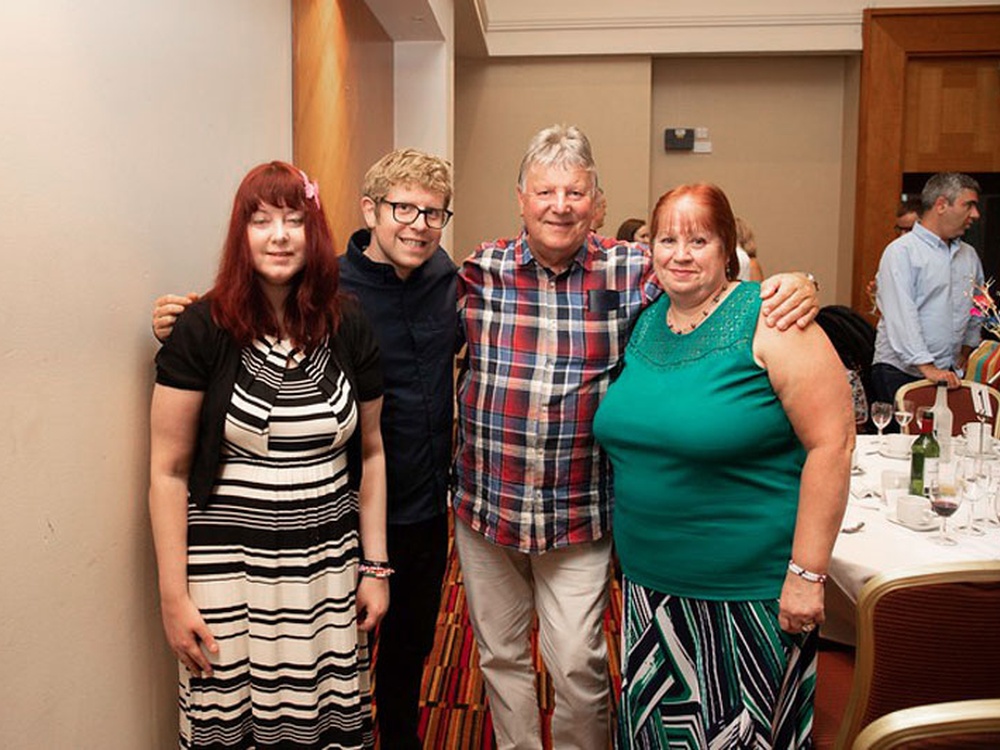When my daughter Laura was eight-years-old she lost her hearing, and from then on I became not just a mum but a carer. Laura needed to have a cochlear implant fitted, and was in and out of hospital a lot. Our son Paul was six at the time, and I felt very guilty having to leave him with friends so often while we went to stay with Laura.
When Laura was 17 she had a muscle biopsy, and we were told she had mitochondrial disease. I was caring for her full-time by this stage, and still managing to work two days a week. Laura's condition has grown progressively worse over the years. She is now 33, and as well as being profoundly deaf she suffers problems with her vision, muscles and breathing, and needs to be tube-fed. For a long time we didn't know what type of mitochondrial disease she had, and it wasn't until two years ago that she was finally diagnosed with RRM2B.
We have had a lot of scares with Laura over the years. Last October she became very unwell and stopped breathing during the night. Luckily she was in hospital at the time, or she wouldn't be with us today. She was rushed to intensive care in Newcastle and put on a ventilator. The doctors told us she might not make it, and I honestly thought we would not be bringing her home again.
We discussed DNR (do not resuscitate) and the option of giving Laura a tracheotomy, which would make her even more dependent and require 24-hour care. I had to make decisions that no mother should ever have to make. I remember feeling a very long way from home, confused and overwhelmed by these terrible choices.
Laura is a fighter, and after four very difficult weeks in hospital, with us staying in nearby hotels, her condition improved enough for her to be allowed home. It was a huge relief to have her home with us again, but my role as a carer was about to become a lot harder.
Laura now needed a ventilation machine and a cough assist machine to help her breath, and had to be tube-fed six times a day because she couldn't swallow. As her carers, my husband and I had to be trained to use all this equipment that our daughter's life now depended on.
By this stage Laura had become very depressed and anxious. She didn't want anyone other than me and her dad looking after her, so I took the decision to leave work. Laura's mobility did not return to the level it has been before her hospital admission, she needed help with everything. We had to adapt our home, fitting a stairlift and also a wet room so we could help her shower.
Caring for Laura is a 24/7 profession, and because mitochondrial disease is so unpredictable you have to be prepared for anything."The emotional impact has been hard to cope with. A lot of the time I feel more like Laura's carer than her mum, and that makes me very sad, and sometimes angry, that mitochondrial disease has taken over our lives. Often my home does not feel like my own, with so many specialists coming and going. Laura has a community psychiatric nurse, a dietician, speech and language doctors and a palliative care team. They are all just looking out for her of course and I'm very grateful for that because I need help to make sure I'm doing everything right, but it has an awful impact on our family life. Caring for Laura is a 24/7 profession, and because mitochondrial disease is so unpredictable you have to be prepared for anything, not just in the home but the numerous hospital visits too. You can't just pack a bag and go out for the day, there are so many things to consider.
Being a carer can feel very isolating. Laura needs me by her side all the time, I can't just go and leave her on her own. If I want any time for myself I have to plan ahead and make sure someone is there who knows what they are doing, usually my husband. There have been times when Laura would not even let me leave the room, she needed to know where I was all the time. We now have a lovely lady called Rachael, who is the same age as Laura and who comes in once a week for five hours. That means my husband and I can go out shopping together, or maybe have lunch. You need a little relief sometimes, and a couple of hours like that makes all the difference.
I would like to think that I will always be Laura's mum first and her carer second, but if I'm honest it doesn't always feel like that. I chose to give up my job to look after Laura and I wouldn't have it any other way. But it truly breaks your heart to have to be a carer, especially for your own child.

